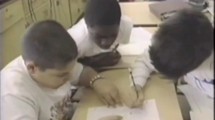Abstract
This commentary brings additional theoretical perspectives to bear on data and findings presented by Anniken Furberg and Hans Christian Arnseth in their paper on students’ meaning making in genetics in collaborative learning activities. The theoretical perspectives converge on the importance of maximizing students’ learning in genetics. The perspectives include the notion of powerful knowledge which raises the issue of whether the curriculum being delivered is a means by which students can acquire powerful knowledge that will provide them with more reliable explanations and new ways of thinking about the world. The role of the teacher in fostering social interactions that result in conceptually focused discussions within small group work also is considered. Finally, the issue of whether students can be taught how to improve the quality of their talk within small groups is explored.
Similar content being viewed by others
References
Havu-Nuutinen, S. (2005). Examining young children’s change process in floating and sinking from a social constructivist perspective. International Journal of Science Education, 27, 259–279. doi:10.1080/0950069042000243736.
Keefer, M. W., Zeitz, C. M., & Resnick, L. B. (2000). Judging the quality of peer-led student dialogues. Cognition and Instruction, 18, 53–81. doi:10.1207/S1532690XCI1801_03.
Mercer, N., & Littleton, K. (2007). Dialogue and the development of children’s thinking: A sociocultural approach. Milton Park: Routledge.
Mercer, N., & Wegerif, R. (1999). Children’s talk and the development of reasoning in the classroom. British Educational Research Journal, 25, 95–111. doi:10.1080/0141192990250107.
Oliveira, A. W., Sadler, T. D., & Suslak, D. F. (2006). The linguisitic construction of expert identity in professor-student discussions of science. Cultural Studies of Science Education, 2, 119–150. doi:10.1007/s11422-006-9039-4.
Southerland, S. A., Kittleson, J., Settlage, J., & Lanier, K. (2005). Individual and group meaning-making in an urban third grade classroom: Red fog, cold cans, and seeping vapor. Journal of Research in Science Teaching, 42, 1032–1061. doi:10.1002/tea.20088.
Venville, G., & Donovan, J. (2005). Searching for clarity to teach the complexity of the gene concept. Teaching Science, 51, 20–24.
Venville, G., Gribble, S. J., & Donovan, J. (2005). An exploration of young children’s understandings of genetics concepts from ontological and epistemological perspectives. Science Education, 89, 614–633. doi:10.1002/sce.20061.
Venville, G., & Treagust, D. F. (1998). Exploring conceptual change in genetics using a multidimensional interpretive framework. Journal of Research in Science Teaching, 35, 1031–1055. doi:10.1002/(SICI)1098-2736(199811)35:9<1031::AID-TEA5>3.0.CO;2-E.
Young, M. (2008). From constructivism to realism in the sociology of the curriculum. In G. J. Kelly, A. Luke, & J. Green (Eds.), What counts as knowledge in educational settings: Disciplinary knowledge, assessment, and curriculum. Review of Research in Education, 32, 1–28.
Author information
Authors and Affiliations
Corresponding author
Rights and permissions
About this article
Cite this article
Venville, G. Powerful knowledge and quality talk: maximising learning of genetics during collaborative group work. Cult Stud of Sci Educ 4, 201–209 (2009). https://doi.org/10.1007/s11422-008-9160-7
Received:
Accepted:
Published:
Issue Date:
DOI: https://doi.org/10.1007/s11422-008-9160-7




